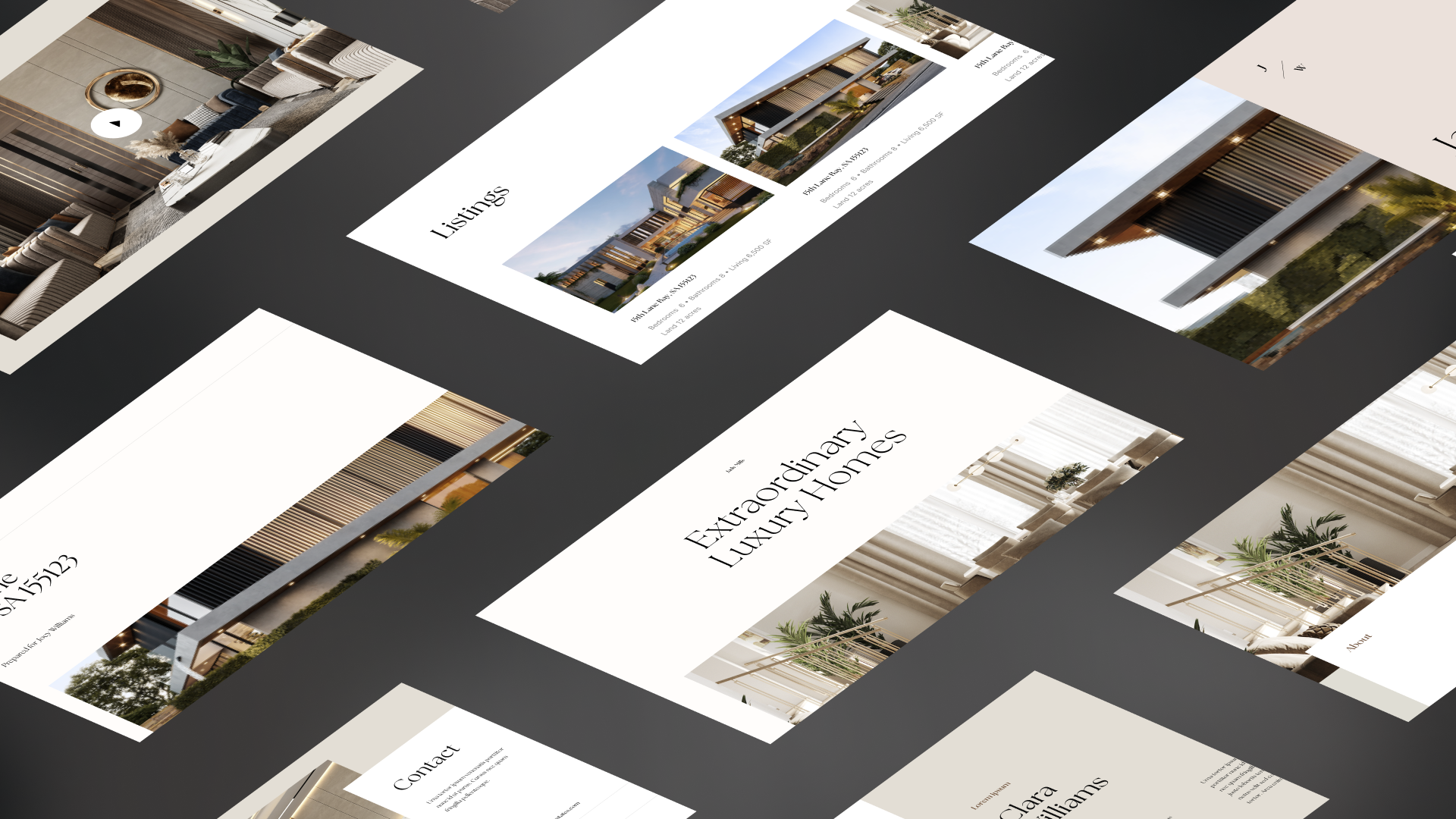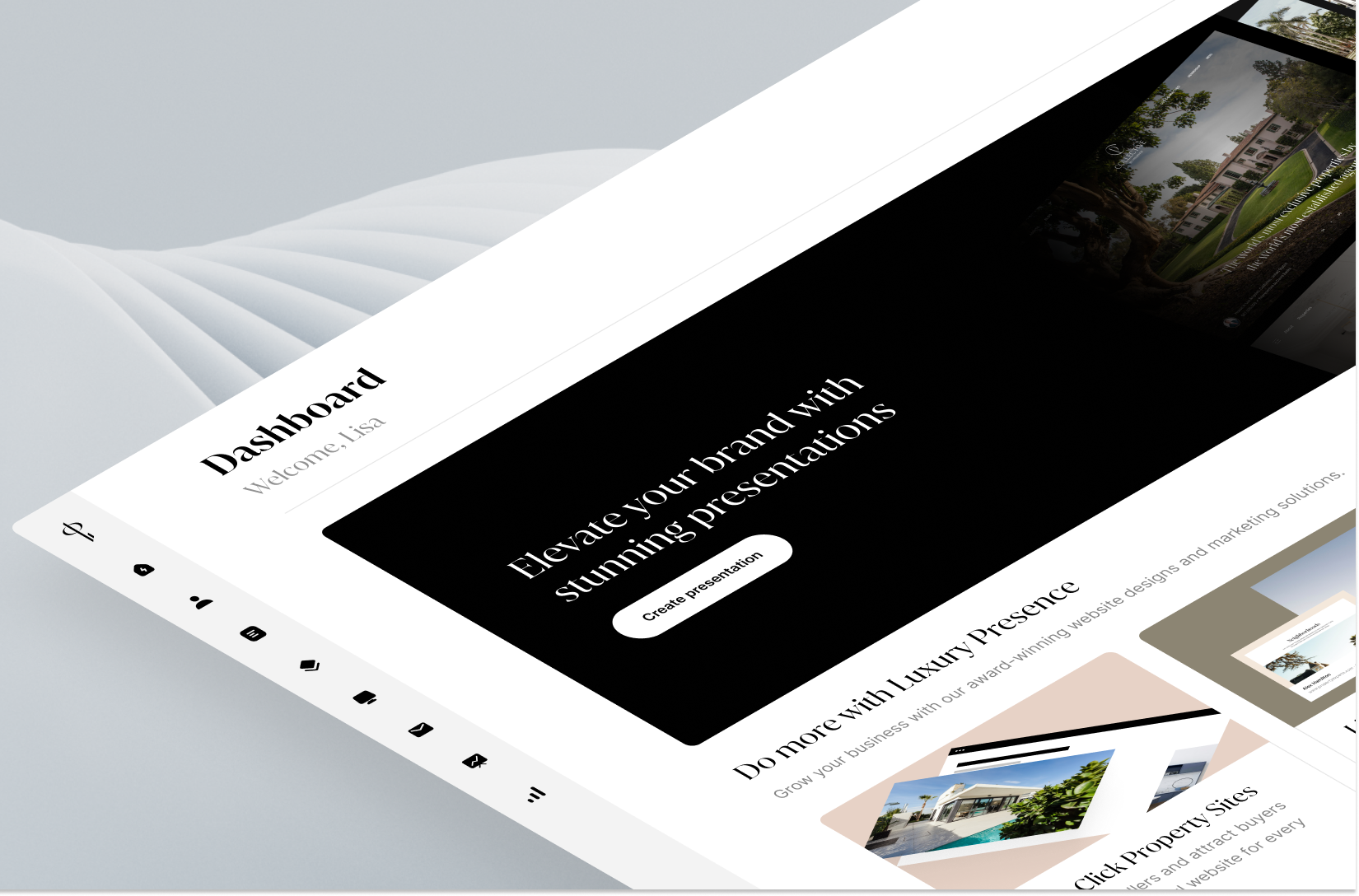If building a new or updated real estate website for your business has been on your to-do list for far too long, you’re not alone. Many people fear the process will be complicated or incredibly time-consuming, causing them to put off getting started.
But it doesn’t have to be that way—and the benefits are well worth the effort. From building your brand to improving your search engine ranking, a professional real estate website is incredibly important for the health of your business.
To help you build a real estate website you love, we’ve created this guide with all the steps you need to get going, plus examples of great real estate websites to draw inspiration from.
Find It Fast
A step-by-step guide to building your real estate website

1. Start with your brand and goals
Your brand is one of the most important marketing assets you can leverage, and your website should represent and elevate it. Before you figure out what you want your website to say and how you want it to look, it’s important to know your brand and what you want to accomplish with your site.
If you already have an established brand, you’re off to a strong start. If not, this Personal Branding Worksheet is an excellent resource to help you establish your brand.
Here are a few questions to ask yourself:
- Will your focus be on residential or commercial properties or both?
- What niche will you focus on?
- What are your goals for your website?
Knowing the answers to these questions will help you build a real estate website that represents you well and helps you grow your business.
2. Choose and register your domain name
The next step is selecting and registering a domain name for your website. This is the URL that visitors will type in or click on to get to your site.
How to choose a domain name
Your real estate website’s domain name represents your brand and establishes your credibility, so choosing the right one is key. The easier your domain is to understand and remember, the faster leads will find you, your listings, and your services online.
Here are some guidelines to follow when selecting a domain name:
- Research your prospective domain name. You can only purchase domain names that are available, so before you get your heart set on a particular name, make sure no one else has registered it. You may also want to check for similar names that could be easily confused with yours.
- Consider including your area. Including the area you cover in your domain name can help prospective clients find you and know right away that they’re in the right place.
- Choose a name that’s easy to type. Avoid using numbers, hyphens, and other special characters, since they can be hard to remember and easily mistyped.
- Keep it short. The shorter the name, the easier it is to remember. A long domain name may result in lost traffic since users are likely to forget or mistype it and may end up on the wrong page.
- Secure a dot-com extension. Due to the high demand for .com suffixes, there are several other extensions available, including .org and .gov. But a .com extension is easier to remember and gives your real estate website more credibility.
- Seek input from friends and colleagues. Run your chosen name by those you trust. If they struggle with the spelling, pronunciation, or understanding of what the site is about, your potential clients likely will, too.
How to register your domain name
After you’ve decided on a domain name for your real estate website, the next step is to register and purchase it. You can do this on domain registration sites such as GoDaddy, Google Domains, Domain.com, and Namecheap.
There are a variety of plans and prices, so make sure to compare at least a few options. You can also check online reviews and feedback about many popular domain registrars. Policies on domain renewals, transferring domains, and privacy rates can vary between companies, so take the time to read and understand the terms and conditions of your domain name registration.
When you’re ready to secure your domain name, most domain registration sites have easy-to-follow directions to guide you. Many also include hosting, website-building tools and templates, and email inboxes, so you have everything in one place. This is especially convenient if you’re new to building and operating a website.
One thing to keep in mind is that your domain registration will have an expiration date. Once a domain name expires, anyone can purchase it and prevent you from using it. Fortunately, many domain registrars have an auto-renewal option to prevent this from happening.
3. Choose a host provider and website builder
How to choose a hosting provider
Next, to build a real estate website, you’ll need to select a host. This is what allows your website to appear on the Internet and stay online.
Here are some factors to consider when searching for a hosting provider:
- Be wary of free hosting plans. While tempting, free plans usually don’t have the bandwidth to support many daily visitors and may impose daily or monthly limits on website traffic. Additionally, free hosts may require advertising on your real estate website to cover their costs. The last thing you want is ad banners cluttering your real estate website.
- Ensure there’s room for your site to grow. This is vital if you expect to add more content to your site and receive more traffic over time.
- Select a secure provider. Your website host provider should offer advanced security features with frequent updates and protection from attacks and malware.
- Check the company’s uptime history. Read reviews and check for uptime guarantees. You want to choose a company whose servers will stay online.
- Look for reliable customer support. Choose a company that prioritizes customer support and has a team available 24/7.
How to choose a website builder
Many companies offer user-friendly tools and templates that make it easier to build a real estate website yourself, or you can work with an expert team to have a site custom-built for you. There are a range of options to choose from based on your preferences and requirements. Lower-priced and free builders are available, though they can be limited in design choices and won’t support some functionality.
Some qualities to look for in a website builder include ease of use, variety of real estate design options, customization options, and search engine optimization (SEO). It’s also important that the builder you choose is reliable and secure.
Ideally, you’ll want to find a builder that specializes in real estate and knows what works for the industry. For a beautiful, feature-packed site that’s easy to launch, Luxury Presence offers award-winning real estate website templates and design services. We’ll dig into these features as well as 4 other solid options for website builders a little later in this post.
4. Design your site and add features
In the competitive real estate business, a well-designed website is vital for engaging visitors and generating quality leads.
Here are some important things to keep in mind when designing your website:
- Consider its aesthetic appeal. Your website represents who you are, and you want it to make a good impression. It should capture visitors’ attention, keep them on your site, build brand equity, and convey your professionalism and sense of style. A beautiful design is important, which includes using high-quality images, easy-to-read fonts, clean and spacious design elements, and colors that reflect your brand.
- Prioritize user experience. If your site is cluttered, slow-loading, and confusing to navigate, visitors will abandon it and go elsewhere for their property searches. Focus on building a user-friendly interface, easy navigation, and quick-loading property listings. Additionally, features such as an interactive map and search filter provide value by helping visitors find listings that match their preferences. A site that functions well also improves your SEO.
- Optimize for mobile. With a responsive design, your website content will display properly across mobile devices, tablets, computers, and browsers. This is extremely important as the majority of buyers and sellers today are using their mobile phones to search for homes and real estate professionals. A responsive website design also improves your search engine ranking, allowing visitors to find your site more easily.
5. Add listings, content, and other valued services
Enhancing your website with listings, relevant content, and smart tools is a surefire way to keep visitors engaged and build your brand.
Consider the following when you start to build a real estate website:
- Feature up-to-date property listings. Listings are an integral part of your real estate website, and it’s vital to keep them updated. You can do this with an Internet Data Exchange (IDX) tool which pulls current listing information from your MLS. At Luxury Presence, our custom IDX tool offers your clients a superior home search experience with a fast, mobile-friendly search that lets them filter properties, save listings, and get listing notifications. It also offers you innovative lead-capture tools to fill your prospect pipeline.
- Offer virtual tours. Virtual tours of available properties bring listings to life, providing an immersive experience before someone even steps foot inside a property.
- Create conversion opportunities. Use Call to Action buttons, form submissions, home valuation tools, and other tools that enable you to capture visitor information so you can follow up with prospective clients.
- Include other valuable content. Consider adding content that provides value to potential clients, such as instant home value reports, real-time market data, neighborhood school information, and local demographics.
- Add contact information. Prominently display your contact information so interested visitors can easily get in touch with you.
- Blog regularly. Posting insightful, relevant blogs can attract visitors and show off your expertise, which builds trust. Think about topics potential clients would be interested in, such as home staging, financing options, and market trends. An active blog can also boost your website’s search engine ranking.
6. Optimize your real estate website for SEO
Given that 75% of users never scroll past the first page of search results, optimizing your real estate website for SEO is crucial for attracting new clients. SEO is all about incorporating strategic keywords and engaging content to boost your website higher in search engine rankings.
Here are a few SEO tips to increase your website’s ranking:
- Optimize your page speed. The slower your site loads, the lower it will rank in search, and the more frustrating it will be for your prospects.
- Improve your layout and design. Make sure your site can be easily navigated and understood by your users. This helps for both SEO and user satisfaction.
- Research popular keywords. Learn what keywords your target market is searching for and include those words on your website and blogs.
- Publish long-form content. Blogs that are over 1,000 words tend to help you improve your rank more than shorter-form pieces. To really up your SEO results, regularly publish content in the 2,000-3,000 word range. Analyze the top-ranking blogs in the SERPs for the keyword you want to rank for to determine how long or short your content should be in order to compete.
- Use internal links. Simply optimizing internal links (such as linking blogs to other blogs and internal pages to other internal pages) has the potential to increase organic traffic by as much as 40%.
- Use compelling meta descriptions and title tags. The meta description is a brief summary of a page that appears in searches, and title tags are the clickable headlines that appear above them. Ensure yours are compelling and use the right keywords.
- Partner with SEO experts. SEO is powerful, but can also be complicated, so consider working with a professional SEO team who has the experience to dramatically improve your rank and bring in more quality traffic.
7. Market and advertise your website
Once your new website is built, it’s time to get it out into the world and start attracting more potential clients.
Here are some tips to help you market and advertise your website:
- Post on social media. Popular platforms like Facebook, Instagram, and LinkedIn are great places to post about your business and website. When posting, use local and topical hashtags (i.e., #MiamiRealEstate, #homebuyers, #luxuryhomes) to help people find your site. You can also join social media groups that are relevant to your market.
- Go live. Harness the power of live video by using live streams on YouTube, Facebook, Instagram, and other social platforms to show off properties and share other content. Make sure to include your website and hashtags in the description fields.
- Build a Google Business Profile. This helps potential clients easily find you in Google Search and Google Maps. Make sure to include the link for your website in your profile.
- Add social sharing buttons. This allows visitors to easily send their friends and families links to listings and other content on your website.
- Include your website address in emails. Add your URL to all marketing emails and your email signature so it’s included in all email correspondence.
- Include your website on your business card. Don’t forget to update your business cards with your new website URL.
Examples of great real estate websites

For inspiration when you start to build a real estate website, check out these examples of high-quality sites that successfully attract, engage, and capture leads.
Carolwood Partners
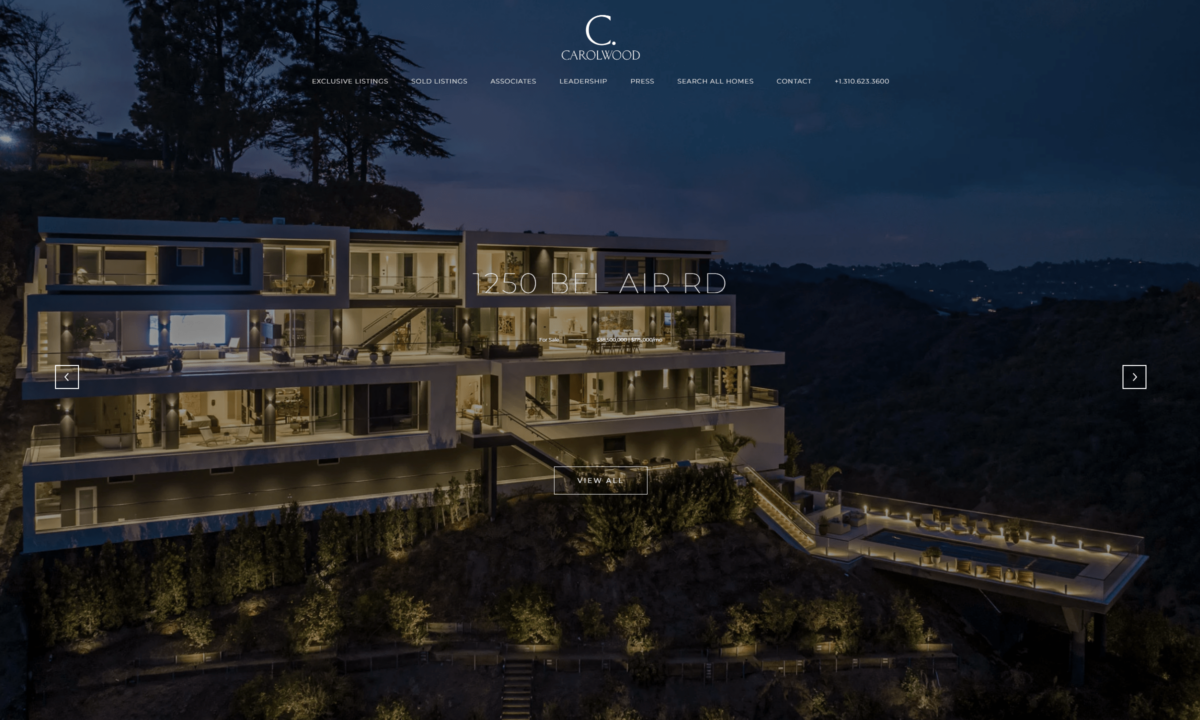
With beautiful full-page visuals, listings with vivid photos and comprehensive descriptions, and fast-loading pages, the Carolwood website delivers an engaging browsing experience for visitors.
The Fridman Group
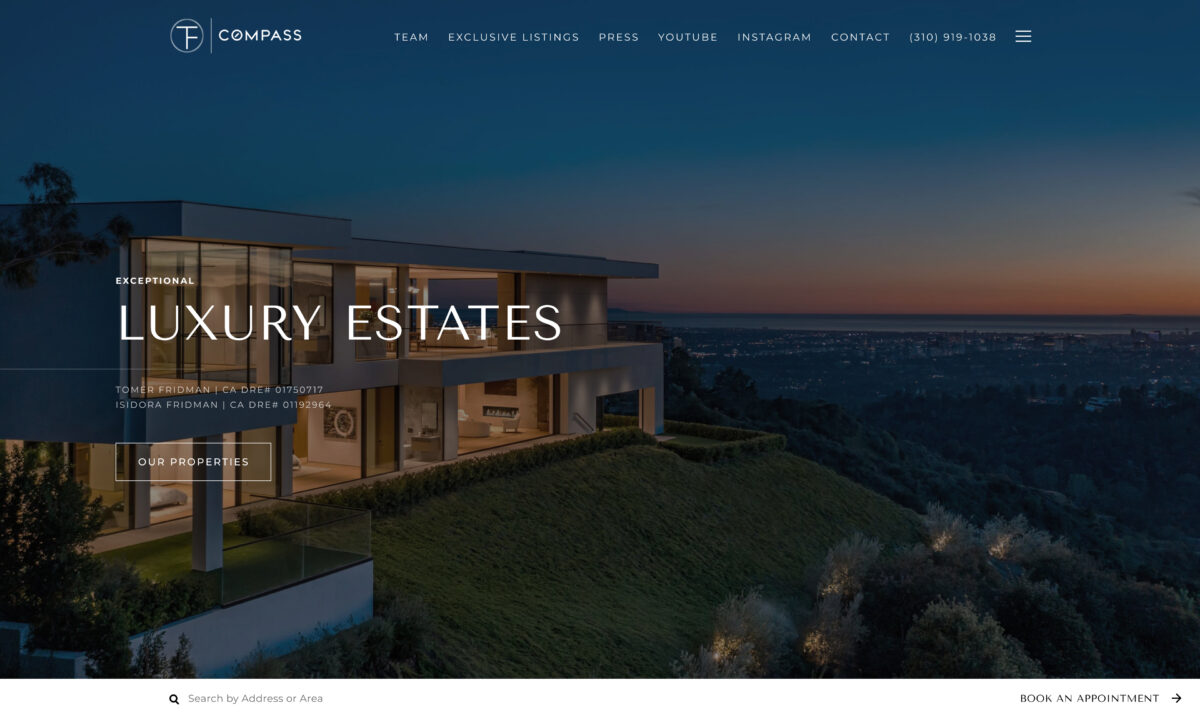
High-resolution property photos and videos and an elegant, modern design create an immersive experience for visitors to the Fridman Group’s website.
Ginger Martin

Ginger Martin’s website draws visitors in with its vibrant photos and videos, minimalist and sophisticated design, and user-friendly navigation.
Jade Mills Estates
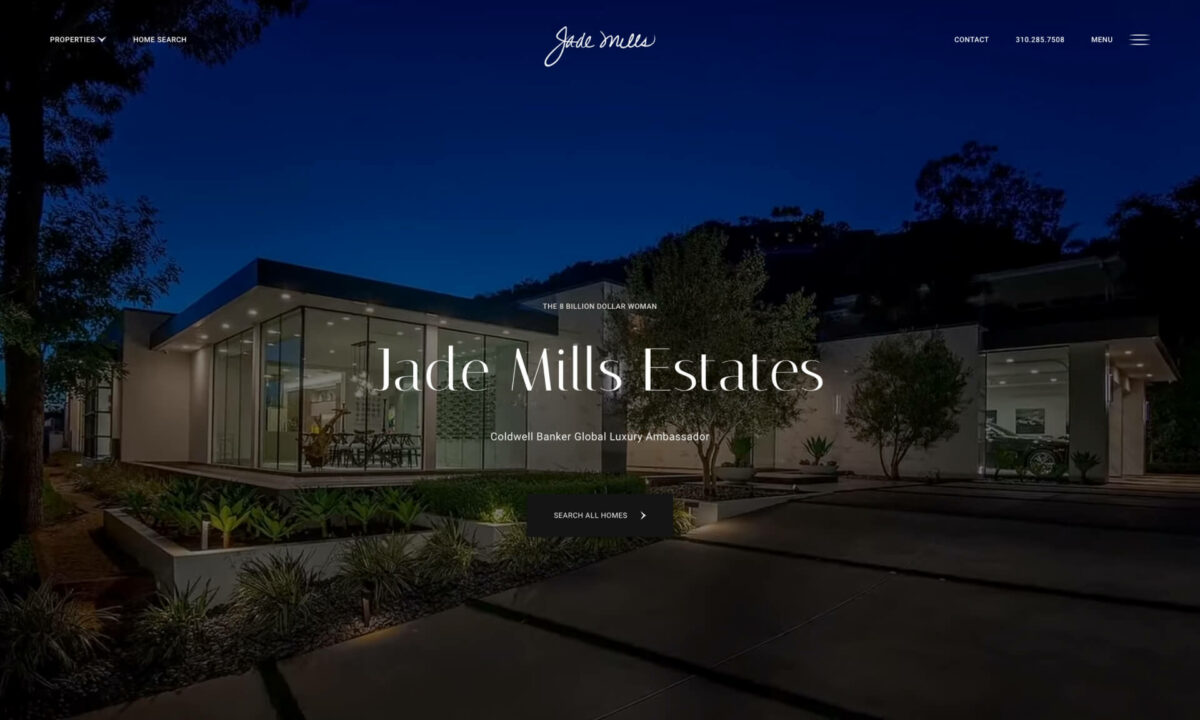
Jade Mills’ website engages visitors immediately with stunning imagery and videography, and the site’s effective use of keywords, outstanding content, and fast-loading pages has earned it a number one ranking on Google.
The top 5 real estate website builders

The website builder you choose should offer a lot of flexibility and features. Things to look for include comprehensive media support, outstanding design and optimization abilities, seamless IDX integration, intelligent lead-capturing features, powerful SEO, and top-notch support.
With those in mind, here are the top 5 website builder options to help you build a real estate website.
Luxury Presence
Luxury Presence is trusted by over 8,000 agents, teams, and brokerages—including 20 of the WSJ’s Top 100—and specializes in award-winning design and marketing solutions for luxury real estate professionals.
Features include:
- Award-winning, customizable designs
- High-converting IDX integration
- Industry-leading SEO services
- Fully responsive, mobile-optimized design
To learn more about the impressive results Luxury Presence has driven for clients, check out these case studies.
Squarespace
Squarespace is a solid option for its user-friendliness and variety of templates, though it doesn’t offer IDX integration and SEO services.
Features include:
- Over 100 templates to choose from, with five specific to real estate
- Easy-to-use lead-capture tools, including pop-ups and contact forms
Duda
Duda offers beautiful templates and a focus on lead conversion, though they lack the native IDX functionality that Luxury Presence offers.
Features include:
- Full customization capabilities
- Simple lead-capturing tools, including email subscription and contact forms
GoDaddy
GoDaddy offers an extensive collection of website templates that help you easily build a real estate website, though it also lacks IDX integration.
Features include:
- Domain registration and hosting services
- Impressive design functionality that makes customization easy
- Built-in SEO tools
Wix
Wix has a beginner-friendly interface, making it a good choice for those just starting out in web building, though there is also no IDX functionality offered.
Features include:
- Unique lead-capturing tools
- Drag-and-drop functionality that makes editing and customizing easy
- SEO tools that help you optimize your search engine ranking
Elevate your online presence and build a real estate website you love
To make a good first impression, build credibility, and continue to grow, a beautiful website is crucial for your real estate business. Whether you’re looking for an award-winning template or a fully custom design, Luxury Presence can help you launch a professional website that elevates your online presence while saving you time and effort.
To get started (and get “launch a new website” off your to-do list!), book a live demo with our team today.
